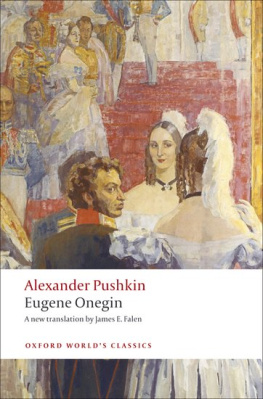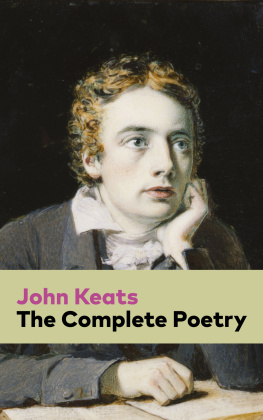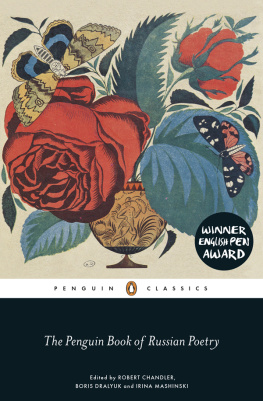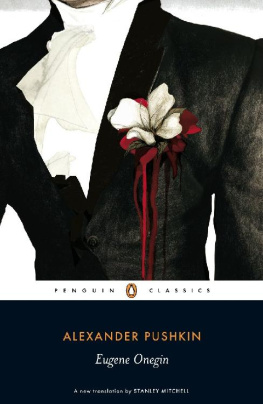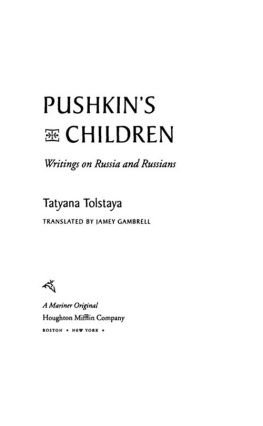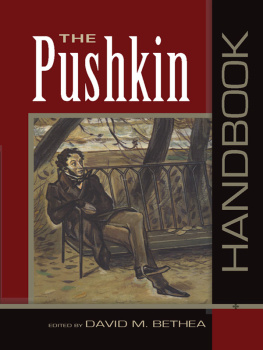This edition first published in the United States in 2002 by Ardis Publishers, an imprint of Peter Mayer Publishers, Inc 141 Wooster Street New York, NY 10012 www.ardisbooks.com Copyright 1963, 1981 by Walter Arndt All rights reserved. No part of this publication may be reproduced or transmitted in any form or by any means, electronic or mechanical, including photocopy, recording, or any information storage or retrieval system now known or to be invented without permission in writing from the publisher, except by a reviewer who wishes to quote brief passages in connection with a review written for inclusion in a magazine, newspaper, or broadcast. J. J.
Meeuws, 1976). Copyright 1976 by Willem A. Meeuws; reprinted by permission of D. J. Richards and the publishers. and ed. (The Hague and Paris: Mouton, 1975). (The Hague and Paris: Mouton, 1975).
Copyright 1975 by Mouton & Company, N.V.; reprinted by permission of Roman Jakobson and the publishers. J. Thomas Shaw, The Author-Narrators Stance in Onegin. Copyright 1980 by J. Thomas Shaw; printed by permission of the author. 2 (Summer 1976). 2 (Summer 1976).
Copyright 1976 by Canadian-American Slavic Studies, Arizona State University, Tempe; reprinted by permission of Sona Stephan Hoisington and the publishers.
The fifteenth anniversary of publication offers a plausible, if tardy, occasion for cleaning, renovation, and adding-on. In the present case these take two forms: revisions, major and minor, in the body of the verse, and the addition of some illuminating critical commentary by Pushkin scholars to the small original apparatus of introduction and annotation. Any significant expansion of the chapter notes beyond the modicum useful to nonspecialists was rendered supererogatory by the plethora of information, opinion, and, at times, bizarrerie on and off
Onegin released in 1964 by V. V. Nabokov with his prodigious two-volume commentaryprobably his most enduring, certainly his most endearing, opus.
The present translation may be superabundantly complemented by the boundless learning of Mr. Nabokovwho did not compliment it, however, except before its publication. The emendations accumulated since 1963 affect perhaps one-third of the stanzas in some chapters, one-twentieth over the whole. They were prompted in a few instances by little quantum jumps in understanding of the poets intent or effects; more often by long-felt distress over syntactic or metric gadgetry, semantic evasions, lexical infelicities (not to mention some hardy misprints, like the inglorious one of the bear in Tatyanas dream who has been on her tailfor trailintermittently since 1963); sometimes, not often enough, by newly perceived shortcuts toward the simplicity and sparkle of the original. Eugene Onegin was my earliest major venture (after parts of Mickiewiczs Polish idyll, Pan Tadeusz) into verse translation in the proper sense of the term; which is, of course, Umdichtung, form-true remaking (from a single translator-poets familiar habitat in both the old and the new linguistic medium) of the poems seamless wholeits shape-content continuum. Twenty years and several larger enterprises later I sense that I am a better poet, certainly a more skillful and fastidious journeyman in the intricate matching and meshing crafts involved.
I hope it shows here and there in the revision. The inclusion of several essays by distinguished contemporary critics and scholars should add very significantly to the readers understanding of this unique work, its author, and the culture in which it is so deeply and permanently embedded. I want to express my warm thanks to Roman Jakobson, David Richards, Thomas Shaw, and Sona Hoisington for their gracious willingness to release their work for the present purpose; and to the editor and publishers of Canadian-American Slavic Studies, Charles Schlacks and Arizona State University; Messrs. Mouton, publishers of Roman Jakobsons Marginal Notes on Eugene Onegin in Pushkin and His Sculptural Myth; and Messrs. Willem A. J. J.
Richards and C. R. S. Cockrell, for granting their kind permission to reprint all or part of the above pieces. W ALTER A RNDT Hanover, New Hampshire1978
Eugene Onegin, Pushkins own favorite and central in his poetic output, is one of the outstanding and seminal works of Russian literature. It is a brilliant evocation of its own time and place, inaugurating realism in the Russian novel, yet it is also intimately related to eighteenth-century French literature and to Byronism.
Extending to nearly 400 stanzas of sonnet length with an original and unvarying rhyme pattern, it is made up in about equal parts of plot, of delicate descriptions of nature and milieu, and of digressions in the Byronic manner. The novel is concerned, as Vladimir Nabokov has put it, with the afflictions, affections, and fortunes of three young menOnegin, the bitter lean fop; Lensky, the temperamental minor poet; and Pushkin, their friendand of three young ladiesTatyana, Olga, and Pushkins Muse. The setting is Russia in the 1820s; the scene shifts from the capital to the country, to Moscow, and back to St. Petersburg, with the author, by way of comment and excursus, subtly moving in and out of the focus of interest. There are superb vignettes of nature in various seasons and moods and of the precocious hedonists cycle of pleasures and dissipations, ending in disenchantment and emotional aridity; there are the authentic physical and mental settings of rustic squirearchy and metropolitan society; a dream, a duel, and two climactic epistles celebrated in Russian literature; and a wealth of autobiographical asides and varied digressionsliterary, philosophical, romantic, and satiricalwhich add to the multiplicity of moods, levels of discourse, and themes. Four English verse translations have preceded this one in the 125 years since Pushkins death.


